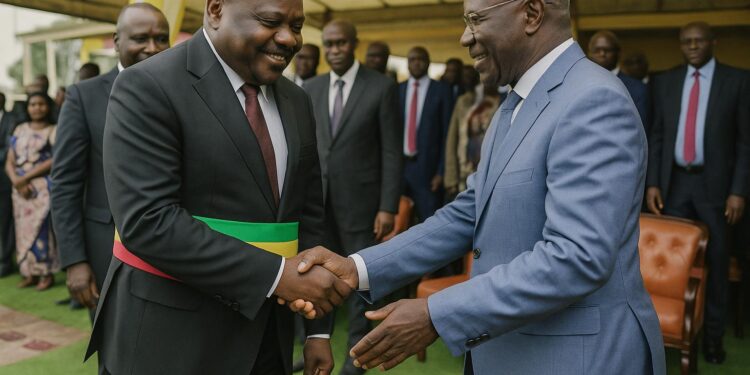Decentralisation drive gains momentum
The Republic of Congo’s decentralisation agenda took a tangible step forward as Interior Minister Zéphirin Mboulou installed Leonidas Mottom Mamouni the inaugural prefect of the newly created department of Djoué-Léfini during a ceremony in Odiba on 30 September 2025.
Officials from the civil administration, defence forces and parliament applauded the move, which they described as a decisive bridge between national policy and local realities aimed at accelerating service delivery in remote riverine and forest communities.
Created by law in October 2024, Djoué-Léfini became the country’s 13th department after consultations that weighed demographics, ecological coherence and transport corridors along the Djoué and Lefini rivers, tributaries feeding the Pool and Plateaux regions.
Brazzaville officials argue that the territorial realignment will reduce administrative bottlenecks while reinforcing the state’s presence across 7,800 square kilometres previously supervised from Kinkala, more than 300 kilometres away by sometimes impassable roads.
Profile of Djoué-Léfini’s fertile corridor
Leonidas Mottom Mamouni’s inaugural speech painted a portrait of abundant lowland valleys that produce cassava, plantain, safou, maize and leafy vegetables, assets that currently feed Brazzaville’s informal markets yet lack structured value chains.
The Lefini Reserve, home to savannah landscapes and populations of guenon, buffalo and lowland gorillas, offers untapped eco-tourism potential for domestic and expatriate visitors seeking weekend escapes one hour north-east of the capital.
Agronomists from the National Research Institute estimate that only 18 percent of the department’s arable land is cultivated, largely by smallholders reliant on rainfall because irrigation infrastructure is minimal and energy coverage remains below the national rural average.
Strategically, Djoué-Léfini sits between Brazzaville’s consumer basin and the Pointe-Noire corridor, making it an attractive node for agribusiness, timber processing and logistics companies targeting regional markets within the Economic and Monetary Community of Central Africa.
Leonidas Mottom Mamouni’s immediate roadmap
The new prefect, a former legislator and minister of culture, pledged to reconcile security imperatives with civil liberties by intensifying border post surveillance while maintaining regular dialogue with traditional chiefs and youth associations.
His administrative cartography unit will complete geo-referencing of boundaries by mid-2026, providing a baseline for land-use planning, taxation and settlement of customary claims that sometimes spark inter-village tensions in forest margins.
Mottom Mamouni cited water access as the primary constraint, signalling talks with the ministries of energy, agriculture and finance to pilot solar-powered boreholes and drip lines across three test cooperatives before the 2026 dry season.
To improve farm-to-market connectivity, the prefecture seeks a public-private partnership for 120 kilometres of laterite feeder roads linking Igné, Ngabé and Mayama to National Route 2, leveraging the existing Road Maintenance Fund.
Opportunities and hurdles for investors
Domestic banks have begun mapping credit lines for cassava flour mills and refrigerated trucks, encouraged by the Treasury’s recent directive allowing departmental authorities to retain 15 percent of collected fiscal revenues for reinvestment.
However, investors still flag electricity reliability and digital connectivity as deciding variables; current fibre rollout reaches only Odiba, while off-grid households depend on diesel generators costing roughly CFA 650 per kilowatt-hour, triple the urban tariff.
The prefecture is engaging Congo’s Agency for the Promotion of Public-Private Partnerships to structure a mini-grid concession that could blend sovereign green bonds, concessional climate finance and operator equity, echoing models piloted in the Sangha and Likouala departments.
Exporters also eye forest carbon programmes under the Central African Forest Initiative; local authorities intend to finalise land-use zoning before submitting any REDD+ project proposals to the national climate council.
Stakeholder expectations and next steps
Residents interviewed in Igné expressed optimism that identification cards, business licences and school transcripts will soon be processed locally, saving both transport costs and days of lost labour previously incurred by travel to Kinkala.
Church leaders welcomed the nomination, stressing that proximity between administrators and citizens can defuse rumours and prevent the spread of misinformation that occasionally fuels communal disputes in peri-urban farming zones.
For policy analysts, the ultimate test will be whether the prefect can synchronise central grants with diaspora remittances, private capital and non-governmental expertise to launch demonstrative projects that create jobs for the region’s estimated 140,000 inhabitants.
Interior Minister Mboulou concluded the ceremony by urging patience yet emphasising accountability, noting that quarterly performance dashboards will be published to track progress on security, infrastructure, revenue mobilisation and public services, setting a precedent other departments may soon emulate.
Economists calculate that a one-percentage-point increase in the department’s agricultural yield could boost Congo-Brazzaville’s non-oil GDP by 0.05 percent, a modest figure nationally but significant locally where primary sector income accounts for nearly two-thirds of household expenditure.
The prefecture plans to publish an annual investment guide, translated into French, English and Lingala, to detail tax incentives, land procedures and environmental standards, aligning with the national investment code revised in 2023 to streamline approvals within 60 days.
Officials anticipate the document’s release before the forthcoming National Economic Forum.












































